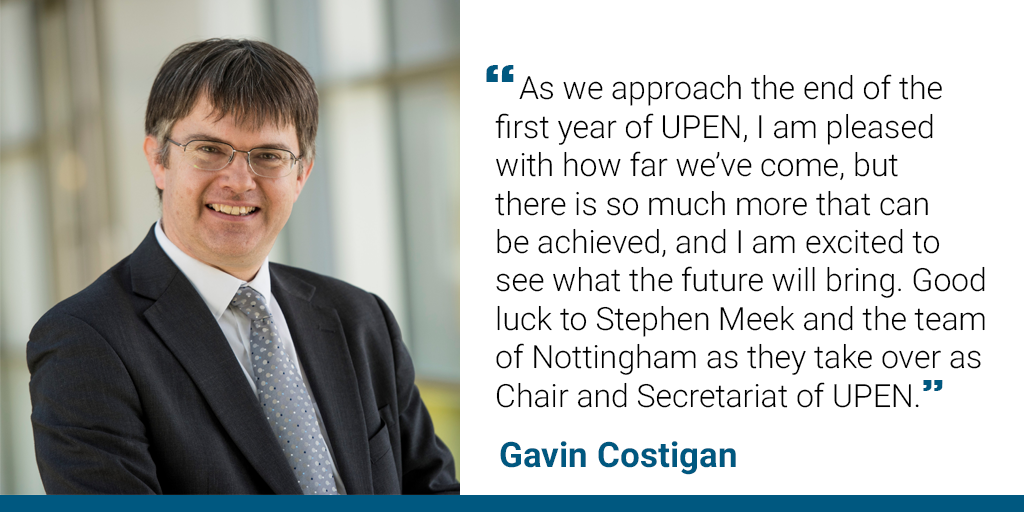UPEN- A year in review led by the Public|Policy Southampton
Posted 2019-06-12 15:12:40 by Gavin Costigan, Chief Executive of the Foundation for Science and Technology, Chair of UPEN for the academic year 2018-19

In the summer of 2018, I was exchanging emails with colleagues in policy brokerage roles across a number of universities. There had been an informal network of us for a year or two, which had met from time to time, but had no formal structure or specific plans. Yet when I mentioned this putative network to contacts in Government, several were excited and keen to attend meetings. The question I provoked last summer was: Is this the time to develop and agree a formalised network?
We concluded it was (and this blog would have been a lot shorter if we’d thought otherwise). I had the honour of chairing the newly formalised Universities Policy Engagement Network for the first year, and the University of Southampton kindly agreed to repurpose some of its ESRC Impact Acceleration Account funding to support the activities of a Secretariat. As we come to the end of that year, it’s a good moment to reflect on how far we’ve come since September.
At the start of the year we had no website, no email address, and no Secretariat. We had had no meetings with Government or Parliament as a network, and no forward programme. We started with around 10 members, and I hoped that this might rise to 15 or 20 over time.
The first few months were spent with two parallel challenges – setting up the logistics and the Secretariat, and getting the network known across Government and Parliament – and across the university sector.
The work on the logistical side of UPEN was co-ordinated by Thea Kouraki. Thanks to her, we have not only a great website, but also an active social media account, blogs from all UPEN members, shared resources, and a professional approach to UPEN activities. The website and social media have been critical in then raising the profile of UPEN. An early article for Wonkhe got us known within universities, and then we began to set up meetings with Government and Parliament.
Over the year, we have had meetings with GO-Science, DWP, DHSC, plus a meeting with Parliamentary colleagues co-ordinated by POST, and a meeting with colleagues working in Wales. These have led to actions and activities at both the UPEN level, and for individual members. As our profile has grown, other parts of Government have approached us, from DfE asking us to arrangement placements, FCO wanting a small piece of synthesis and HMRC looking for academics researching taxation. UPEN is being asked to do things, and is delivering. As most of these have been the first time we have done things, we have been developing our processes as we go.
As well as working directly with policy professionals, another key opportunity of UPEN is to learn from each other, and to identify and develop best practice. We have had two meetings in the year looking at this, one focussed on training (the material we provide for academic staff and students to help them engage with policymakers) and the other on secondments and placements into government.
In terms of numbers, UPEN now has 36 members, and continues to grow. This is way beyond what I expected a year ago, and is a great strength. We have members across the UK from institutions of different sizes and types. If UPEN speaks about the use of UKRI funding for public policy impact, for example, it can do so with an authoritative collective voice. As decisions are made in the coming year or two about impact and IAAs, for example, UPEN could and should seek to influence the debate.
The large numbers of UPEN members also poses a challenge. In the first year, we set up meetings with Government departments and invited all UPEN members to attend if they wanted to. Lots did, and we squeezed people in. But as numbers grow, that model does not work. A 36-way discussion is difficult, and it’s also tricky just finding meeting rooms large enough. As UPEN goes forward, we will have to develop new models for engagement, with different members taking the lead with different stakeholders.
As we approach the end of the first year of UPEN, I am pleased with how far we’ve come, but there is so much more that can be achieved, and I am excited to see what the future will bring. Good luck to Stephen Meek and the team at Nottingham as they take over as Chair and Secretariat of UPEN for its second year.
Gavin Costigan is Chief Executive of the Foundation for Science and Technology and Chair of UPEN for the academic year 2018-19.
Author: Gavin Costigan, Chief Executive of the Foundation for Science and Technology, Chair of UPEN for the academic year 2018-19|/resources/images/blank.png










































































































